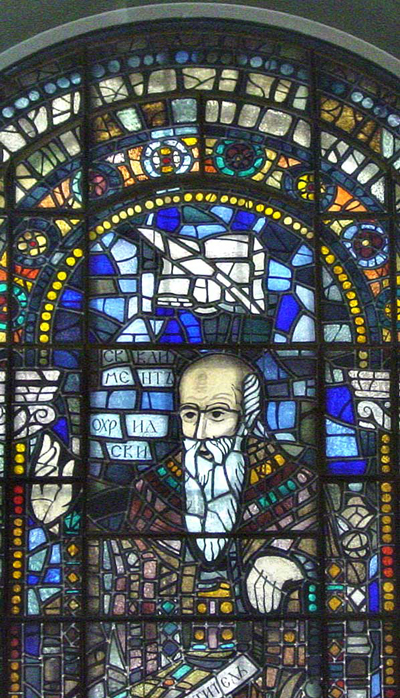The Bulgarian academic community united by Bulgaria’s oldest university, Sofia University (founded in 1888) marks the day of its patron and heavenly guardian St. Kliment Ohridski (St. Clement of Ohrid) on 25 November.
A solemn liturgy will be held in the St. Kliment Ohridski academic chapel at the Faculty of Theology which will be followed by the traditional procession to the monument of St. Kliment Ohridski where wreaths will be laid. The aula of Sofia University will host an academic celebration to mark the Day of St. Kliment Ohridski University of Sofia. The event is the culmination of the program of the Kliment Days of the University which maintain a busy agenda throughout November.
 Back in 1902 the Academic Council selected 25 November, the Feast of St. Kliment Ohridski – as its patronal day. The image of the saint is a symbol of the pursuit of education and knowledge. The first Kliment Festival was held in 1916 in Ohrid (today in the Republic of Macedonia) – the city where Kliment founded the Ohrid School. There St. Kliment built a few churches and monasteries, trained thousands of Bulgarian clerics and wrote dozens of orations for all major Christian feasts.
Back in 1902 the Academic Council selected 25 November, the Feast of St. Kliment Ohridski – as its patronal day. The image of the saint is a symbol of the pursuit of education and knowledge. The first Kliment Festival was held in 1916 in Ohrid (today in the Republic of Macedonia) – the city where Kliment founded the Ohrid School. There St. Kliment built a few churches and monasteries, trained thousands of Bulgarian clerics and wrote dozens of orations for all major Christian feasts.
In 1916 on the occasion of the 1000 death anniversary of the patron of the University, Bulgarian scholars left for Serbia and Russia where they started research of the life and work of the saint.
The teachers of St. Kliment Ohridski were the Holy Brothers Cyril and Methodius – the creators of the Slavonic alphabet, and the patrons of Kliment’s work were two of Bulgaria’s greatest statesmen. The first was Prince Boris I who officially introduced Christianity and the Slavonic alphabet to the Bulgarian lands. He invited Kliment to Bulgaria after the failure of the Great Moravian mission. Boris I donated real property to Kliment and he began work within the boundaries of 9 c. Bulgaria. The spiritual and educational activity of St. Kliment saw its greatest progress during the reign of Tsar Simeon the Great /who led the First Bulgarian State from 893-927/. It was Tsar Simeon who ordained him as "the first bishop in the Bulgarian language". During that time he was Exarch of Macedonia and the Rhodope Region (Southern Bulgaria).
Kliment passed away 916 and the cult for him quickly spread to Ohrid and the whole region. He was venerated as a protector during plague and war. He was accepted as wonder worker and thousands of sick people flocked to his grave with a hope for cure.
A man of letters, teacher and propagator of the Slavonic script during the Middle Ages, St. Kliment Ohridski is venerated as one of Bulgaria’s greatest spiritual leaders. The Orthodox Church has established 25 November as the day to honor the memory of St. Kliment. However, the saint is revered not only by the church but also by all Bulgarians. This is so because St. Kliment Ohridski contributed not only into the consolidation of Christian faith in Bulgaria, but also led the process in which the Bulgarian nation emerged as a nation with its unique alphabet and culture.
Compiled by Gergana Mancheva
English Daniela Konstantinova
Photos: bg.wikipedia.org
The head of the statue of Tyche, the goddess of Philippopolis, has been discovered in the Episcopal Basilica in Plovdiv, said the head of the excavations Lyubomir Merdzhanov. According to him, this is an extremely rare artefact that has been awaited..
105 years ago, on November 27, 1919, a treaty was signed in the Parisian suburb of Neuilly-sur-Seine, officially ending Bulgaria's participation in World War I (1914-1918). Historians define the document as "another national..
On November 25, the Bulgarian Orthodox Church honours the memory of St. Clement of Ohrid – a distinguished archbishop, teacher and scholar. He was among the most prominent disciples of the brothers Cyril and Methodius, the Holy Seven Apostles – the..
The head of the statue of Tyche, the goddess of Philippopolis, has been discovered in the Episcopal Basilica in Plovdiv, said the head of the..

+359 2 9336 661
